#c: jay gatsby
Text
Okay but when Gatsby drags Nick to the Speakeasy where he’s CLEARLY out his depth, stuck next to a scary lookin’ stranger adorned in human teeth whose claiming to ‘know all about’ him, and then, without warning, Gatsby just fckn LEAVES HIM THERE bc he gets triggered by the sight of his crush’s husband, this fckn dood
#i ADORE Jay Gatsby with all my heart but goddamn it this fckn guy#( ( ;; O O C ;; ) )#( ( ;; RAMBLINGS ;; ) )#~ J A Y G A T S B Y ; ; worth the W H O L E damn bunch of 'em ~#~ N I C K ; ; S C R I B B L I N G S ~
3 notes
·
View notes
Text
Book Recommendations 📚📒
Business and Leadership:
"Good to Great" by Jim Collins
"The Lean Startup" by Eric Ries
"Zero to One" by Peter Thiel
"Leaders Eat Last" by Simon Sinek
"Outliers: The Story of Success" by Malcolm Gladwell
Success and Personal Development:
"The 7 Habits of Highly Effective People" by Stephen R. Covey
"Mindset: The New Psychology of Success" by Carol S. Dweck
"Atomic Habits" by James Clear
"Grit: The Power of Passion and Perseverance" by Angela Duckworth
"The Power of Habit" by Charles Duhigg
Mental Health and Well-being:
"The Power of Now" by Eckhart Tolle
"Feeling Good: The New Mood Therapy" by David D. Burns
"The Gifts of Imperfection" by Brené Brown
"The Anxiety and Phobia Workbook" by Edmund J. Bourne
"The Dialectical Behavior Therapy Skills Workbook" by Matthew McKay, Jeffrey C. Wood, and Jeffrey Brantley
Goal Setting and Achievement:
"Goals!: How to Get Everything You Want—Faster Than You Ever Thought Possible" by Brian Tracy
"The 12 Week Year" by Brian P. Moran and Michael Lennington
"Drive: The Surprising Truth About What Motivates Us" by Daniel H. Pink
"The One Thing" by Gary Keller and Jay Papasan
"Smarter Faster Better" by Charles Duhigg
Relationships and Communication:
"How to Win Friends and Influence People" by Dale Carnegie
"The 5 Love Languages" by Gary Chapman
"Crucial Conversations: Tools for Talking When Stakes Are High" by Al Switzler, Joseph Grenny, and Ron McMillan
"Nonviolent Communication: A Language of Life" by Marshall B. Rosenberg
"Men Are from Mars, Women Are from Venus" by John Gray
Self-Help and Personal Growth:
"The Subtle Art of Not Giving a F*ck" by Mark Manson
"Daring Greatly" by Brené Brown
"Awaken the Giant Within" by Tony Robbins
"The Miracle Morning" by Hal Elrod
"You Are a Badass" by Jen Sincero
Science and Popular Science:
"Sapiens: A Brief History of Humankind" by Yuval Noah Harari
"The Immortal Life of Henrietta Lacks" by Rebecca Skloot
"Cosmos" by Carl Sagan
"A Short History of Nearly Everything" by Bill Bryson
"The Selfish Gene" by Richard Dawkins
Health and Nutrition:
"The China Study" by T. Colin Campbell and Thomas M. Campbell II
"In Defense of Food" by Michael Pollan
"Why We Sleep" by Matthew Walker
"Born to Run" by Christopher McDougall
"The Omnivore's Dilemma" by Michael Pollan
Fiction and Literature:
"To Kill a Mockingbird" by Harper Lee
"1984" by George Orwell
"The Great Gatsby" by F. Scott Fitzgerald
"The Catcher in the Rye" by J.D. Salinger
"Pride and Prejudice" by Jane Austen
#books#books and reading#reading#goodreads#bookshelf#bookish#readersofinstagram#reading list#personal improvement#personal development#life advice#advice
1K notes
·
View notes
Note
I'm intrigued by your comparison of tsh, the great gatsby, and heathers, would you care to share some points?
Golly gee! I’m glad you asked, Anon!
(Obvious major spoilers for the three of these things. Also, I’m using the 1988 film for Heathers. I like the musical, but I like the movie a bit more, and it better suits my points here. There are a few differences in tone between film and musical especially regarding J.D.)
(This talks about triggering topics seen in each of these stories.)
/Opening/
All three of these stories provide critical looks at certain communities, and all of them focus on at least one character whose goal is to reach a particular worldly ideal, to achieve a certain aesthetic lifestyle. Gatsby goes about this in a very reflective and melancholy way. Heathers uses humor and satire. The Secret History uses elements of both.
I really like Joseph Campbell and Thomas C. Foster who analyze character archetypes and tropes. Their points are not that this is necessarily copying or unoriginal but that human storytellers often get attracted to the same concerns, ideals, and concepts— we end up revisiting frameworks such as the hero’s journey or the “vampire” archetype for characters. But what is enriching is the author’s own way of commenting on these things. If we look at, say, Henry, Gatsby, and J.D, they are all wildly different people but the same character type. So let’s go though how the stories are all saying the same thing but exploring it differently.
/Great Gatsby vs Secret History/
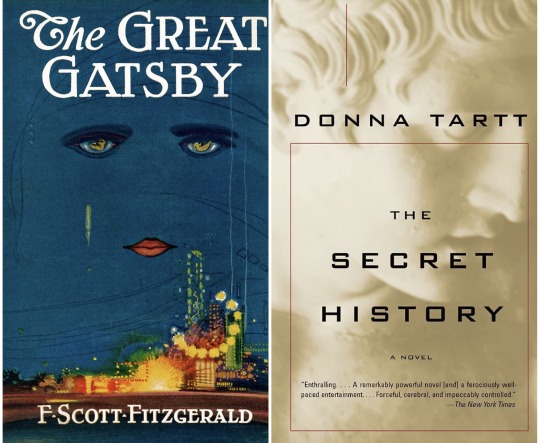
Let’s start with TGG and TSH. Richard mentions early on that he identifies with Gatsby, and that this is his favorite novel. I’ve seen a few people question this because Richard is much closer to Nick Carraway. And, from a POV perspective, he is. They’re both outsiders attracted to the mystique of another character. And they’re just neutral enough that different characters can approach them about things. But Richard seeing himself as Jay Gatsby is also accurate, because Gatsby has a similar internal struggle to Richard himself. Richard’s flaws and goals are exactly Gatsby’s. Both men resent the lives they were born into, viewing them as dull and not a reflection of how they see their own identities. They take matters into their own hands to achieve their ideal regardless of the methods. Richard finds himself attracted to the Greek class, and particularly awestruck by Henry, because Henry is a Gatsby-type too. And it’s more Henry who functions as Gatsby in a POV way. Henry does what he must to achieve his desired Hellenistic lifestyle, just as Gatsby chases for the American dream.
The stories also make similar points about the effect of this behavior on other people, particularly women. A big topic of TGG is carelessness. It’s seen through the symbolism of cars. The characters are reckless with their vehicles. Cars are stylish and exciting, but also linked to violence. We see this general concept with Julian who is careless with his teaching methods. Him leaving at the end, dead and broken people in his dust, reminds me of Daisy and Tom at the end of Gatsby, and Nick saying: “They were careless people, Tom and Daisy— they smashed up people and things and creatures and then retreated back into their money or their vast carelessness, or whatever it was that kept them together and let other people clean up the mess they had made…” Julian does something similar.
Obviously, Camilla and Daisy fill similar roles. They’re women who aesthetically fit into the lifestyle the male characters want. Daisy is a stunning American socialite. Camilla is a pretty classics student who plays the roles of big name Greek ladies (notably Clytemnestra) in the class’s readings. Gatsby, Henry, and Richard seem to have varying levels of actual love for these women. But the idea is the same: “In order to fully complete my own self-transformation, I need to have a woman emblematic of my ideals.” Even Charles fits into this because his views of Camilla get twisted by his toxic and Romanesque concept of what it means to be a male head of household. Both Camilla and Daisy are aware of their own lack of agency. Daisy’s famous line saying the best thing a girl can be is “a pretty little fool” isn’t meant to be taken as the author’s own opinion, it’s Daisy saying she wishes her daughter will be too stupid to realize what an awful situation she’s in. Camilla and Daisy know that they eventually just need make a plan and go with the man that will make their life easiest. For Daisy, that ends up being Tom. For Camilla, it’s Henry.
As a side note, I saw someone drawing Gatsby comparisons from TSH and mention that Charles is Tom. And I do understand the connection made here (Charles becomes an antagonistic figure for Henry, and they fight over a woman) but it seemed slightly off to me, and I realized it’s because I view Charles way more like George Wilson. Wilson is incredibly impacted by the immorality going on around him, and views the eyes of T.J. Eckleburg as a constant reminder that God is watching them all. In the end, he has a mental breakdown, victimizes his wife Myrtle then loses her. Wilson and Charles come to the same conclusion at the end: which is to attack and kill Gatsby/Henry with a gun. There are obvious differences. For example, Wilson is wrong that Gatbsy killed Myrtle (that was Daisy) and cheated with her (that was Tom). But the backbone is there: a man is haunted by the existence of objective morality. He then reaches a conclusion he must violently seize control and kill the one he sees as responsible.
/Heathers vs. Secret History/

While Gatsby focuses on a desire to be part of an American upper class and TSH focuses on a desire to be part of an erudite class, Heathers focuses on what I’m going to call teenage politics. Jocks, mean girls, bad boys, etc. The cliques of high school. Veronica is a member of the popular girl group at school and is mistreated by her clique. What she craves is to be part of what J.D. represents. He’s a mysterious outsider who is intimidating but also recites poetry and likes Bach. The way he’s introduced is very “Hey look at this guy. He’s not shallow like the Heathers, Kurt, and Ram. He’s layered.” Veronica very much falls into the trap of believing a damaged, edgy boy is somehow deeper than everyone else. She also wants to be dangerous and above the other high school cliques. Veronica is exactly like Richard because she knows J.D. is excessively violent the day she meets him when he threatens football players with a gun, but she believes there’s something cool and beautiful in that. She sees that his opinions are more cultured than her friends, but doesn’t stop to analyze what kind of person would fire blanks at people during school. Well, surprise surprise, it turns out the bad boy is… well literally just an awful person. There’s no hidden heart of gold like in the movies. Heather Chandler was terrible, but her death brings to light that people like J.D. are worse. And, to me, the situation with Bunny and Henry is similar. Both protagonists go along with the killing (I say this because Veronica was kind of sucked into it more than a premeditated accomplice), because they were abused by the victim and want to avoid jail time. But it’s also noteworthy that that victim represents a type of person who is opposite of the protagonist’s ideal. Bunny is an uncultured slob when Richard wants sleek intellectualism. Heather Chandler is a vapid mean girl when Veronica wants cool people of substance. Both protagonists eventually realize that the person they’ve partnered with is the bigger threat.
Heathers and TSH also unfold similarly. Both the Hampden and the Sherwood (Westerburg) communities react to the murder in a way that is so absurd and really off-the-mark. The Sherwood community mistakes Heather’s death as a suicide then proceeds to project deep feelings onto her and rationalize her rude behavior (sometimes in hysterical ways) because tortured souls are deep. They hold all these suicide prevention spectacles that the viewer can see are not really about preventing suicide at all. They’re about showing that people are feeling things and painting Westerburg High as a place full of psychologically complex people. Bunny’s death gets mistaken as drug usage and similar circuses ensue. There are people projecting onto Bunny because he died young. The whole section in TSH where they do the national drug trivia competition to raise awareness and Hampden College dominated was HILARIOUS in its irony, and I literally went, “This is so totally in the tone of Heathers” when I read it.
The way the stories handle the “idealism” character is similar too. Henry and J.D. come across as so wise and above nonsense at the start. You’re distracted by their language and finer tastes. Then, you see that they’re clever when they are able to get away with murder. But the story starts to show you that they’re actually super one-note in ways. Henry and J.D. both get almost embarrassing to watch because you start to see how horribly unaware they are. Henry is focused on what book to bring to his FBI meeting, as if that matters, and he seriously thinks the psychic lady might catch them. J.D. starts to come across as so silly because you see how often he speaks in trite little poetic statements that are stupid in context, but that he clearly thinks sound good (“People will look at Westerburg and say there’s a school that self destructed not because society didn’t care, but because that school WAS society. Pretty deep, huh?”). Both Henry and J.D. meet their downfalls because they’re after random, insubstantial “profound” things. Henry goes out with a suicide tied to a tender kiss with a woman, to prove that he could become the perfect Hellenistic figure Julian wasn’t. J.D.’s suicide was a similar thing: a message to Veronica about how complex and world-rejecting he is. (This is a part that differs in the musical. J.D. is actually self sacrificial there. I respect that the musical had to make J.D. softer to accommodate his songs, but the film character’s actions stick more firmly to the lesson of the story).
Heathers is more of a comedy than TSH is, but they both poke fun then take steps back. Bunny’s funeral is a complete clown show but there are moments of genuine sadness and Richard realizing how evil the thing they did was. There’s a funeral in Heathers where Veronica and J.D. are giggling because they know the things being said about their victim are stupid. Then Veronica catches sight of a crying little girl and stops, shocked by the sudden reality of what she did.
Both stories also comment on group mentality. The Hampden community and Westerburg community are prone to ridiculous conclusions and nonsensical actions because of how quickly stupid ideas get latched onto. The Greek class murders Bunny because they’re all downplaying each others’ best traits and drawing out the worst. I listened to an interview with Tartt where she points this out and states that nobody in the class would have become a murder on his or her own. There’s a well done scene in Heathers where Heather McNamara attempts suicide because she’s depressed but also influenced by what she thinks were here friends’ suicide. Veronica stops her and says “everybody jumped off a bridge, would you do it?” McNamara gives a very honest and defeated, “Probably.” Both stories explore how people can and often do go against rational judgment when others are involved.
/Tying it all together/
At their core, these stories are all doing the same thing: they’re showing how easily humans can be influenced by romantic ideals that they lose control of their moral judgment. The works all show that people can so dearly love the aesthetic of a person and what he or she represents that they create an illusion that masks the person’s flaws. Gatsby goes about this in a very respectful, dignified way. Heathers is full of humor and moments that are meant to be shocking and hilarious rather than realistic. The Secret History does both. It’s not as formal as Gatsby but not as outwardly making fun of itself and all is characters as Heathers is. It’s also partially satire but not at the level Heathers is; Heathers is literally just making fun of its own genre (teen romance films). It presents itself as a cliche movie then just swerves violently into insanity and a tone that mocks all its character archetypes. TSH and Gatsby are both much more up front. As a result, there are some scenes in TSH that strike me as very Gatsby (scenes where Richard is being more reflective and philosophical) but there are also scenes that are so wild they seem to be working how scenes from Heathers did.
Back to archetypes and tropes: While these stories have the same skeleton (a character facing reality after being caught up in romanticizing something), they explore things differently due to different social constructs and narrators of different backgrounds. We have an 30-year-old upper class man whom everyone treats as a secret-keeper. We have a new adult who desperately wants to put his lackluster and abusive childhood behind him. Then we have a teen girl who lacks a perspective outside the drama of high school. They all have personality differences and varying levels of culpability in the violence, with Richard having the most since he was a knowing participant in a murder. Veronica is next because she was part of a murder, stuck with J.D. longer than she should have, and covered things up, but was repeatedly tricked into killing when she didn’t want to. Nick rocked the boat but wasn’t a direct part of any death. Veronica takes back the most control at the end. She lights her cigarette on the explosion that killed J.D. (which, wow, metal). She tells J.D. she wants “cool guys” out of her life then goes to get new friends and move past what happened, as arguably unrealistic as that is. Richard ends up with the least control because he CAN’T move on; the events of the story have permanently damaged him in a deep, spiritual way. These endings lean into different concepts: Heathers lets the protagonist triumph and embrace her lesson. TSH focuses on how immorality has lasting effects on the soul. TGG ends by showing pity for people like Gatsby.
This is the same for J.D., Gatsby, and Henry. They’re very different kinds of people which provides variation to the concept they represent. TGG doesn’t present Gatsby as evil, just tragic and wrong. He did hurt people with his shady dealings, but he’s painted as a man who still has his soul. J.D. and Henry actually have pretty intense evil in them and a clear lack of concern for human life. Nick and Richard still hold love for Gatsby and Henry, even after all that happened. Veronica completely denounces J.D.
I mentioned this in the previous post, but I just love stories like this. I love characters who get these kinds of reality checks, and I love characters who have such strong passions that they have to struggle with. And all three of these stories are so very smart. They’re each so unique in the presentation of these similar ideas that none of them feel like a discount version of another. The methods of story-telling are so different, and their focuses, allusions, settings, tones, and motifs vary as well.
Wow, this is not even all I had to talk about. I could genuinely write a 40 page paper on this.
#Wow did you actually finish this??#This is another one of those posts I get if people couldn’t get through#its my personal chicken soup for the soul#In the musical Veronica says ‘dear diary I believe I am a good person’#that is so Richard#TSH#the secret history theory#The secret history#henry winter#bunny corcoran#richard papen#donna tartt#the great gatsby#jay gatsby#nick carraway#Donna tartt#heathers 1988#Heathers#Veronica sawyer#J.D.
30 notes
·
View notes
Text
GUYS GUESS WHAT 💥
we now have a bracket! poll times are hit or miss. we'll see
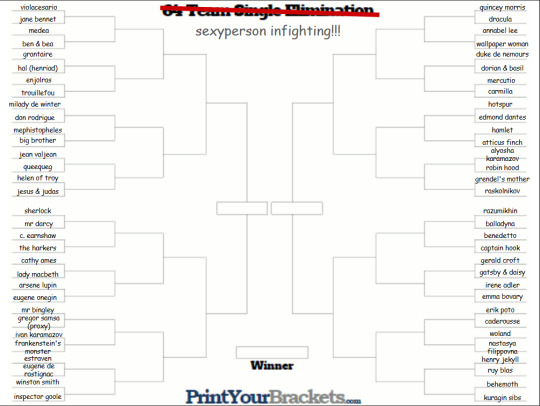
your matchups are under the cut vvv
PART A
Viola/Cesario (Twelfth Night) vs Jane Bennet (Pride and Prejudice)
Medea (Greek mythology) vs Benedick and Beatrice (Much Ado About Nothing)
Grantaire (Les Miserables) vs Prince Hal (the Henriad)
Enjolras (Les Miserables) vs Clopin Trouillefou (Notre Dame de Paris)
Milady de Winter (The Count of Monte Cristo) vs Don Rodigue (Spanish folktales)
Mephistopheles (Faust) vs Big Brother (1984)
Jean Valjean (Les Miserables) vs Queequeg (Moby Dick)
Helen of Troy (Greek mythology) vs Jesus and Judas (the Bible)
PART B
Sherlock Holmes (the Sherlock Holmes books) vs Fitzwilliam Darcy (Pride and Prejudice)
Catherine Earnshaw (Wuthering Heights) vs Jonathan and Mina Harker (Dracula)
Cathy Ames (East of Eden) vs Lady Macbeth (Macbeth)
Arsene Lupin (the Arsene Lupin books) vs Eugene Onegin (Eugene Onegin)
Charles Bingley (Pride and Prejudice) vs Gregor Samsa (The Metamorphosis)
Ivan Karamazov (The Brothers Karamazov) vs Frankenstein's Monster/Adam (Frankenstein)
Therem Harth Ir Em Estraven (The Left Hand of Darkness) vs Eugene de Rastignac (The Human Comedy)
Winston Smith (1984) vs Inspector Goole (An Inspector Calls)
PART C
Quincey Morris (Dracula) vs Count Dracula (Dracula)
Annabel Lee (Annabel Lee) vs the Woman Behind the Wallpaper (The Yellow Wallpaper)
the Duke de Nemours (La Princess de Cleves) vs Dorian Gray and Basil Hallward (The Picture of Dorian Gray)
Mercutio (Romeo and Juliet) vs Carmilla (Carmilla)
Hotspur (the Henriad) vs Edmond Dantes (The Count of Monte Cristo)
Hamlet (Hamlet) vs Atticus Finch (To Kill a Mockingbird)
Alyosha Karamazov (The Brothers Karamazov) vs Robin Hood (assorted folktales)
Grendel's mother (Beowulf) vs Rodion Raskolnikov (Crime and Punishment)
PART D
Dmitri Razumikhin (Crime and Punishment) vs Balladyna (Balladyna)
Benedetto (The Count of Monte Cristo) vs Captain Hook (Peter Pan)
Gerald Croft (An Inspector Calls) vs Jay Gatsby and Daisy Buchanan (The Great Gatsby)
Irene Adler (the Sherlock Holmes books) vs Emma Bovary (Madame Bovary)
Erik/the Phantom (The Phantom of the Opera) vs Gaspard Caderousse (The Count of Monte Cristo)
Woland (The Master and Margarita) vs Nastasya Filippovna (The Idiot)
Henry Jekyll (The Strange Case of Dr Jekyll and Mr Hyde) vs Ruy Blas (Ruy Blas)
Behemoth (The Master and Margarita) vs Anatole Kuragin and Helene Bezukova (War and Peace)
#lesgooooooo#rip beatty he died for the bracket to go up#still mourning his loss tbh#anyways#classic lit sexyperson bracket#tournament poll#let's see if depression holds up i guess??????
17 notes
·
View notes
Text
round 1, part c
#queer classic lit ship tourney#AHAHAHA THE BIG GUNS#round 1#round 1c#tournament#the great gatsby#the picture of dorian gray
32 notes
·
View notes
Note
The kind of movie where they take a beloved classic work of fiction and turn it into a deranged high school rom com
I like the way you think!
I do think this list would change depending on which classic work of fiction we were adapting. you did not specify one so I'm picking The Great Gatsby, because a) I've read that one b) as far as I know no one has crowbarred it into a USA high school setting yet and c) it would be really funny to see someone try.
(if you have a different book you'd adapt to this genre, let me know!)
Soundtrack:
Lone Digger (Caravan Palace)
Make Me Feel (Janelle Monáe)
Feeling Good - Bassnectar Remix (Nina Simone, Bassnectar)
Money (The New Respects)
7 rings (Ariana Grande)
everything i wanted (Billie Eilish)
explanations and links below the cut
(the music supervisor game)
1. Lone Digger (Caravan Palace) - The vibe I'm going for here is modern pop influenced by the 1920s and 30s, stuff that will remind the audience of the Roaring 20s aesthetic/the Baz Luhrmann movie while staying grounded firmly post-2000. So: electro swing! This is an early needle drop, maybe during Nick Carraway's introduction to Fitzgerald High. (He's the new student.)
youtube
2. Make Me Feel (Janelle Monáe) - I am a Janelle Monáe stan first and foremost. This song establishes the romantic energy of the Gatsby/Daisy/Tom love triangle and the fun of non-stop partying... with just a hint of the manic energy that will creep up on us later.
youtube
3. Feeling Good - Bassnectar Remix (Nina Simone, Bassnectar) - Not the 1920s, but a similar idea: mixing old and new styles of music. In my head this is playing at the first Big Party Nick attends, as he realizes just how rich Gatsby is.
youtube
4. Money (The New Respects) - This is a good montage song, and it's very on-theme. (It's a deranged high school rom com, I'm allowed to do on the nose choices.) Could be Nick and Gatsby hanging out, advancing the plot, could be Gatsby and Daisy cheating on everyone with each other, but either way things are moving and not in a good direction.
youtube
5. 7 rings (Ariana Grande) - Shit has officially hit the fan. And Jay Gatsby has officially hit Myrtle with his car. We're in the final act of the movie, moving ceaselessly toward the confrontation that probably ends with Gatsby's death. The aesthetic of extreme wealth and conspicuous consumption is still there, but it's all gone dark.
youtube
Credits: everything i wanted (Billie Eilish) - Not everyone interprets this book the same way, but I think this song hits the emotions of the ending pretty well. It doesn't quite mesh stylistically with the rest, but it would work for the credits. And it's popular, right? The teens still like Billie Eilish?
youtube
full playlist (youtube)
6 notes
·
View notes
Note
when will jay gatsby & nick carraway get to be happy? exact time & place much appreciated
(also use this as a freebie to throw out sick quotes)
your house. tomorrow. /j (TY elliot ilyyy)
"Nick stares up at Gatsby, waiting with bated breath for him to take it all back, to feign exhaustion and leave him there. He's never been much of a hopeful person, but something about the countless days with Gatsby must have changed him, because a light, floating feeling swells in Nick's chest as he gazes into his brown, sparkling eyes.
From where he stands on the porch, the sunset surrounds Gatsby in red and gold like a halo."
theres so much more of this part i could share but waugh,,(doesnt wanna give away too much :]c)
wait does this sound angsty. this is a good thing i promise. mwah mwah theyre happy here (i dont know what im saying anymorrle goodbye)
#styx says#comfort of yesterday#btw im on my phone rather than lappy so i have to retype each snippet cuz copying and pasting is a pain in the ass !!!!!!#so if u see any typos no u dont<33
1 note
·
View note
Text
ADORATION IN THE EYES OF THE BEHOLDER
Eros:
Eros is the Greek god of love. It represents romantic or passionate love. This one is the most popular form of all types of love in literature, especially in the classics and pre-classics, and likewise alluring. The more famous are Romeo and Juliet, Pride and Prejudice, and Anna Karenina.
Philia:
The word Philia stems from Philos. It is the love of goodwill and friendship. Furthermore, this understanding of love transforms the possessive love into an impulse for philosophy. Friendship is regarded highly in literature. There are many stories of true friendship such as A Tale of Two Cities and The Kite Runner that warm the cockles of your heart.
Storge:
Storge is the Greek word for natural affection. It is familial love. Little Women, Robinson Crusoe, Inheritance and The Weight of a Piano are most noteworthy examples of this.
Agape:
Agape is the universal love. It is the comprehensive feeling for the entire cosmos. This type of love in literature is more spiritually inclined. This genre includes powerful literary works such as Outwitting the Devil, The Disappearance of the Universe When Breath Becomes Air.
Ludos:
Ludos originated from the word ludo, meaning ‘I play’. This is the skittish kind of love. This type of love, in literature, is portrayed many times as betrayal. A few examples are Macbeth, Paper Princess, and The Sense of an Ending.
Pragma:
Pragma stems from ‘pragmatic’, duty and reason are the foundations. Consequently, it is seen in the form of arranged marriage. A beautiful classic- The Bride, and from more recent times, A Thousand Splendid Suns, and The Princess Diaries make you see the world from a totally different perspective.
Philautia:
Philia, which means ‘between equals’ , is the root for Philautia. Philautia means self-love, love within oneself, it is the process of loving ourselves. The most classic examples in literature are The Four Agreements, The Gift of Imperfection and Untethered Soul are more recent examples.
TOP TEN CLASSIC ROMANCES
Pride and Prejudice:
Why end with tragedy when you can end with a wedding? Jane Austen, that queen of Regency romance, wrote many love stories, but none can beat that of Elizabeth and Mr. Darcy. Their societal dance around one another is inescapable, and the threat of destitution looming over all unmarried women gives Elizabeth’s journey real tension. Pride and Prejudice endures as THE favorite literary romance.
Romeo and Juliet:
Before all the rest, Shakespeare wrote the quintessential tragic love story that has been the mold for star-crossed lovers ever since. Their families hate each other, but somehow, these idealistic adolescents find a love that could end all strife. Of course, we all know that it was not to be for Juliet and her Romeo. Whether you root for them or not, Shakespeare’s characters speak truths which have echoed through the centuries.
The Great Gatsby:
F.Scott Fitzgerald’s great American novel set during the Roaring Twenties gave us the story of Jay Gatsby and Daisy Buchanan. Gatsby, a man who quite literally built his fortune just to impress the love of his life, remains separated from her until the narrator introduces them again.
Jane Eyre:
When Jane is hired as a governess to the ward of Mr. Rochester, she practically stumbles into his affections. But what do you do when the man you love forgot to tell you that he’s already married to a madwoman? Charlotte Bronte’s Gothic love story is at times baffling, but always filled with intensity.
The Notebook:
Nicholas Sparks’ first published book (and popular movie adaptation) tells the story of love’s endurance. Noah and Allie share an exciting teenage summer romance, which is stopped by Allie’s mother. Years later, they are reunited and rekindle their love. The story is told by an elderly man to his wife who is suffering from Alzheimer’s.
Gone with the Wind:
Scarlett O’Hara may be the epitome of a difficult woman, but Rhett sure loves her. Money, power, and the Civil War drive them apart, yet they are drawn back together time after time. Scarlett and Rhett share a stubbornness that makes their romance raw and unapologetic.
Wuthering Heights:
Catherine and Heathcliff, lovers without the opportunity. Their relationship grows from childhood but is sabotaged by both their family and themselves. The overlapping of family ties and romantic love may raise some eyebrows, but their story remains a much-beloved classic.
The Remains of the Day:
If your tastes tend away from the dramatic fire of your romance, Kazuo Ishiguro’s novel about the would-be love between an English butler and housekeeper may strike your fancy. It’s a story of what could have been, woven into the daily work of pre-World War II service.
Anna Karenina:
The passionate (and tragic) affair between Anna and her lover Vronsky is contrasted with one of the sweetest, most gentle romances in literature: Kitty and Levin. Although Kitty initially dismisses Levin for his age (fourteen years her senior), his patience and enduring love win her affection. And unlike most romances, the novel continues past their wedding day.
Lady Chatterley’s Lover:
Yes, it’s been accused of being thinly masked pornography, but the torrid love affair between Constance (Lady Chatterley) and her gamekeeper, Oliver Mellors, is filled with passion, class struggles, and a woman’s acceptance of her desires.
0 notes
Text
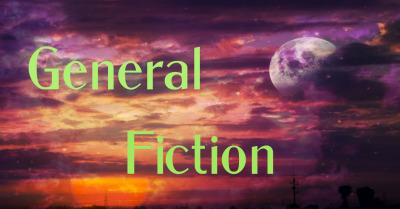
#
1Q84 by Haruki Murakami
A
Ahsoka by E.K. Johnston | Alias Grace by Margaret Atwood | Alice Have I Been by Melanie Benjamin | Alice’s Adventures In Wonderland by Lewis Carroll | Animal by Lisa Taddeo | Ariadne by Jennifer Saint | Artemis Fowl Series by Eoin Colfer
B
The Band by Nicholas Eames | Bitter by Akwaeke Emezi | The Boxcar Children by Gertrude Chandler Warner
C
Charlotte’s Web by E.B. White | Choke by Chuck Palahniuk | The Chosen and The Beautiful by Nghi Vo | Circe by Madeline Miller
D
The Dark Tower Series by Stephen King | Deerskin by Robin McKinley | The Dictionary of Lost Words by Pip Williams | Dietland by Sarai Walker | Dreadnought by April Daniels
E
Ella Enchanted by Gail Carson Levine | Enders by Lissa Price | The Enlightenment of Bees by Rachel Linden
F
Fable: the Balverine Order by Peter David | Fable: Reaver by Peter David | Fairy Tales of Remnant by E.C. Myers | Fight Club by Chuck Palahniuk
G
Good Omens by Terry Pratchett and Neil Gaiman | The Great Gatsby by F. Scott Fitzgerald
H
Hamlet by William Shakespeare | Harper Connelly Series by Charlaine Harris | The Hitchhiker’s Guide to the Galaxy by Douglas Adams | The Hobbit by J.R.R. Tolkien | How To Train Your Dragon Series by Cressida Cowell | The Hunger Games by Suzanne Collins
I
The Illuminae Files by Amie Kaufman, Jay Kristoff | The Importance of Being Earnest by Oscar Wilde | Interior Chinatown by Charles Yu | Invisible Monsters by Chuck Palahniuk | Iron Widow by Xiran Jay Zhao
J
K
Killers of a Certain Age by Deanna Raybourn | A Knight of the Word by Terry Brooks
L
Last Flight by Liane Merciel | Loki: Where Mischief Lies by Mackenzi Lee | The Long Way To A Small, Angry Planet by Becky Chambers | The Looking Glass Wars by Frank Beddor | The Lost Girls by Sonia Hartl | Lost in the Never Woods by Aiden Thomas | Lullaby by Chuck Palahniuk
M
The Memoirs of Lady Trent by Marie Brennan | Middlesex by Jeffrey Eugenides | Misty of Chincoteague by Marguerite Henry
N
A New Dawn by John Jackson Miller | Night of the Living Rez by Morgan Talty | A Noodle Shop Mystery by Vivien Chien | Not Your Sidekick Series by C.B. Lee
O
Oryx & Crake by Margaret Atwood
P
The Penelopiad by Margaret Atwood | Percy Jackson Series by Rick Riordan | Pet by Akwaeke Emezi | Plain Bad Heroines by Emily M. Danforth | The Portrait of Dorian Grey by Oscar Wilde | A Prayer For Owen Meany by John Irving | The Priory of the Orange Tree by Samantha Shannon
Q
R
The Reckoners Series by Brandon Sanderson | Red Riding Hood by Sarah Blakley-Cartwright | The Robber Bride by Margaret Atwood | Ruination by Anthony Reynolds
S
A Series of Unfortunate Events by Lemony Snicket | The Shadow and Bone Trilogy by Leigh Bardugo | Sherlock Holmes by Sir Conan Doyle | The Sisterhood of the Traveling Pants by Ann Brashares | Starters by Lissa Price | Survivor by Chuck Palahniuk | A Swiftly Tilting Planet by Madeleine L'Engle
T
The Tale of the Nutcracker by E.T.A. Hoffman | These Ruthless Deeds by Kelly Zekas & Tarun Shanker | These Vicious Masks by Kelly Zekas & Tarun Shanker | To Be Taught If Fortunate by Becky Chambers | Toil & Trouble: 15 Tales of Women & Witchcraft by Elizabeth May | Treasure Island by Robert Louis Stevenson | The Two Princesses of Bamarre by Gail Carson Levine
U
Uglies Series by Scott Westerfeld | Until I Find You by John Irving
V
W
The Wayfarers Series by Becky Chambers | Wayward Children Series by Seanan McGuire | When Christmas Comes Again: The World War One Diary of Simone Spencer by Beth Seidel Levine | The Wicker King by K. Ancrum | William Shakespeare's Star Wars: Verily, A New Hope | A Wind In The Door by Madeleine L'Engle | The Witcher Series by Andrzej Sapkowski | The Wizards of Once by Cressida Cowell | The World According to Garp by John Irving | A Wrinkle In Time by Madeleine L'Engle
X
Y
The Yellow Wallpaper and Other Stories by Charlotte Perkins Gilman | The Young Elites Series by Marie Lu
Z
Zeus Grants Stupid Wishes by Cory O'Brien
0 notes
Note
trying to find some new books to read and going to tiktok to find recs and all i see are c*lleen h*over 😔
christina pls tell me you have some good recs i’ve been in such a slump lately and i can’t get out
BABES I GOT YOU FUCK HER ALL MY HOMIES HATE HER WHAT TYPE OF BOOK DO YOU WANT:
Legendborn by Tracey Deonn takes place during today's time on UNC campus and follows 16 year old Bree Matthews after her mother's death, but something about it seems way off. She ends up seeing some shit and getting involved in both the Legendborn, descendants of the Knights of the Round Table and King Arthur as well something known as "root" which is tied to her African American ancestors. I'm not normally a fan of fantasy but tHIS I will recommend until I die
The Honeys by Ryan de la Sala follows Mars after they wake up with their twin sister standing over them with a knife, possessed by something that they have no idea what it is. Determined to figure out what happened to their sister, they go to her favorite place, a camp for the elite in upstate New York, where Mars' sister was a member of click known as "the Honeys." This is more horror which again, I'm not a fan of, but this book had me actually shrieking
Loveless by Alice Oseman follows Georgia and her two best friends from high school as they navigate college. Georgia is feeling the pressure of everyone else around her seemingly knowing exactly who they are while she has no clue. Alice Oseman is the author of Heartstopper as well. I've read their entire backlist and there is nothing bad by them.
Before the Coffee gets Cold by Toshikazu Kawaguchi is about a small cafe in the basement of a building in Tokyo, Japan, that can send people to any point in time under the following conditions: 1, they can only meet people who have been to the cafe; 2, they cannot move from the seat where they are or else they are stuck in that time and essentially dead; 3, anything they do will not alter the present time, meaning if you know someone is going to die, no matter what you do if you go back in time, they are still going to die the same time the same way; 4, you have to finish the coffee before it gets cold in order to get back or again, you are stuck. This book had me SOBBING over it because it is so beautiful and heartbreaking
Self-Made Boys: A Great Gatsby Remix bu Anna-Marie McLemore is basically what if Jay Gatsby and Nick Carroway are both trans men who also love each other, and Nick and Daisy are Latine but Daisy is white passing and Nick is not. Fucking amazing
Gravity by Tal Bauer is a mlm hockey romance about a hockey player named Hunter who gets traded to Montreal (not the habs but like the books fictional equivalent) and meets his childhood hero, and his new team captain, Bryce. Be warned that Bryce does have a pretty graphic injury described in the second half of the book, but once you hit it, you can skip it and still get the gist of what's going on
These Violent Delights by Chloe Gong is a Romeo and Juliet retelling but set in 1926 Shanghai with a mysterious monster killing members of the Montagov and Cai family gangs. This is what I'm reading right now, and I'm loving it so far
0 notes
Note
for asks; 1, 6, 26, 28 hehe
(: (:
from this post!
1. Who is/are your comfort character(s)?
Charlie Kelmeckis, Frisk, Jay Gatsby, if c!George counts I'd say him I guess?
6. Why did you do that?
This reminds me of that song from "A Star is Born" that Lady Gaga sang in the movie
26. A scenario that you’ve replayed multiple times?
Dream finally DMing me back so I can get his handwriting tattooed
28. Do you wear a mask?
Yes, with a smile for hours at a time :/
1 note
·
View note
Text
thinking about c!quackity as jay gatsby
1 note
·
View note
Note
bookshelf tour? :O
because it rotates i'd have to take a million pictures to give you an actual tour but i do have a list of the books on my shelf and desk that i made in preparation for The Great Reorganization. if read more cuts still don't work on mobile i am sorry 🙏
on my black penguin classics shelf i have:
city of god by saint augustine
the canterbury tales (middle and modern english) by chaucer
a journal of the plague year by daniel defoe
the monk by matthew lewis
the crucible by arthur miller
frankenstein by mary shelley
fanny hill by john cleland
war and peace by leo tolstoy
women in love by d. h. lawrence
my thesis ("villainous pardoners and preachers: christian satire in chaucer's canterbury tales and sinclair lewis's elmer gantry") is also on this shelf lol. and on top of my bookshelf i have a children's illustrated edition of the pilgrim's progress by john bunyan. i meant for my mom to buy the penguin classics version but she got tricked into buying that edition but it's honestly okay bc the illustrations are nice i think
the rest of my bookshelf is organized alphabetically by the author's last name
beowulf by anonymous
little women by louisa may alcott (severely aware that it should go little women and then beowulf but i'm too dedicated to the idea of beowulf being first. maybe that means i should order these chronologically in The Great Reorganization)
confessions by saint augustine
six of crows and crooked kingdom by leigh bardugo
the diviners and lair of dreams by libba bray
jane eyre by charlotte brontë
alice's adventures in wonderland by lewis carroll
i am one of you forever by fred chappell
beastie boys book by michael diamond and adam horowitz
the miraculous journey of edward tulane and the tale of despereaux by kate dicamillo
robinson crusoe by daniel defoe
crime and punishment and the idiot by fyodor dostoevsky
the great gatsby by f. scott fitzgerald
water for elephants by sara gruen
rebel of the sands by alwyn hamilton
dune by frank herbert
a thousand splendid suns by khaled hosseini
televangelist by ron johnson (a book that i was going to use for my thesis until i realized how poorly written it was lol)
illuminae, gemina, and obsidio by amy kaufman and jay kristoff
it by stephen king
elmer gantry and it can't happen here by sinclair lewis
the restoration and the eighteenth century norton anthology (volume c)
the paper menagerie and other stories by ken liu
a burning by megha majumdar
one hundred years of solitude by gabriel garcía márquez
convenience store woman by sayaka murata
i'll give you the sun by jandy nelson
a monster calls and more than this by patrick ness
hamnet by maggie o'farrell
wonder by r. j. palacio (feel like i'm alone in not liking how this one ends)
bridge to terabithia by katherine paterson
again, but better by christine riccio
esperanza rising by pam muñoz ryan
aristotle & dante discover the secrets of the universe by benjamin alire sáenz
okay for now by gary schmidt
the invention of hugo cabret by brian selznick
the norton shakespeare complete collection
frankenstein by mary shelley (in a different edition)
a far cry from kensington, loitering with intent, and the prime of miss jean brodie by muriel spark
east of eden by john steinbeck
dracula by bram stoker
the joy luck club by amy tan
roll of thunder, hear my cry by mildred d. taylor
the castle of otranto by horace walpole
and i darken by kiersten white
everything, everything by nicola yoon
and then i have the overflow on my desk. most of it is stuff i've had to read for this semester
the fact of a doorframe, selected poems 1950-2001 by adrienne rich
collected poems by carol ann duffy
the color purple by alice walker
main street, arrowsmith, and babbitt by sinclair lewis
a webster's crossword puzzle dictionary compiled by jane shaw whitfield
the waves and mrs. dalloway by virginia woolf
invisible man by ralph ellison
a children's bible by lydia millet
countdown by deborah wiles
the hobbit and the fellowship of the ring by j. r. r. tolkien
entitled by kate manne
things fall apart by chinua achebe
the plague by albert camus
selected prose of t. s. eliot
catch and kill by ronan farrow
collected poems, 1909-1962 by t. s. eliot
saints and villains by denise giardina
justice by michael j. sandel (derogatory)
jesus and creativity by gordon kaufman
the christological controversy by richard norris
the black christ by kelly brown douglas
creation and the cross by elizabeth johnson
the nature and destiny of man, volumes 1 & 2 by reinhold niebuhr
i also have a bunch of books upstairs from when i was a kid but those r not important. haven't touched them in a Long time but there's a ton of them
#now that i'm graduating i can buy the books that i want to buy and actually read them though. v exciting#we also own the rest of lotr and dune but those books are my dad's. the fellowship of the ring is technically but it's on my desk rn#so it is mine.#i also have the last copy of my school newspaper on my desk and two copies of the school magazine#both different volumes#long post#i need to put my miley cyrus ''autobiography'' down here. for the aesthetic
0 notes
Video
youtube
In one of the universe, we fall in love, we exchange our vows and we find a home. We are tangled up together in the sheets every night and open our eyes to each other because we made it. In this universe we made it.
#edits#the great gatsby#tggedit#gabriella wilde#garrett hedlund#daisy buchanan#jay gatsby#fanvidfeed#vidding#viddingisart#c: jay gatsby#c: daisy buchanan
4 notes
·
View notes
Text

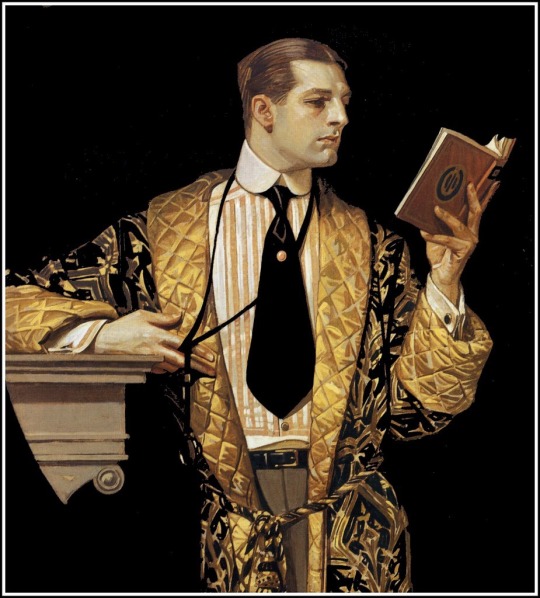
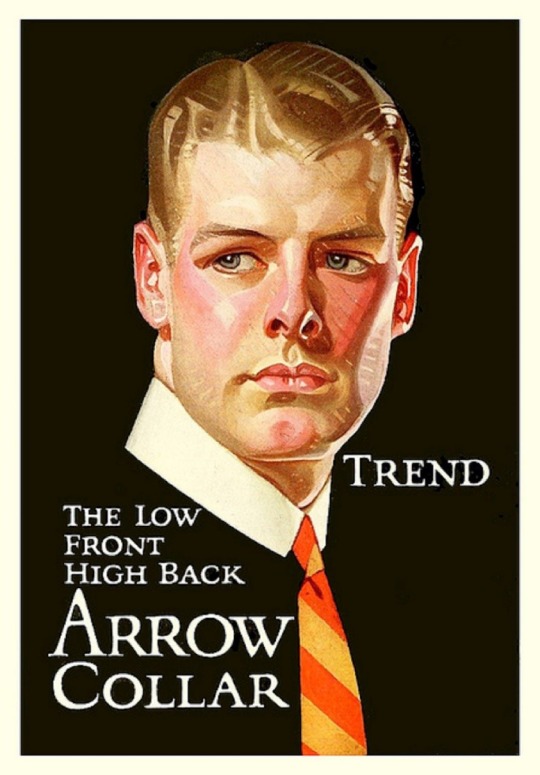
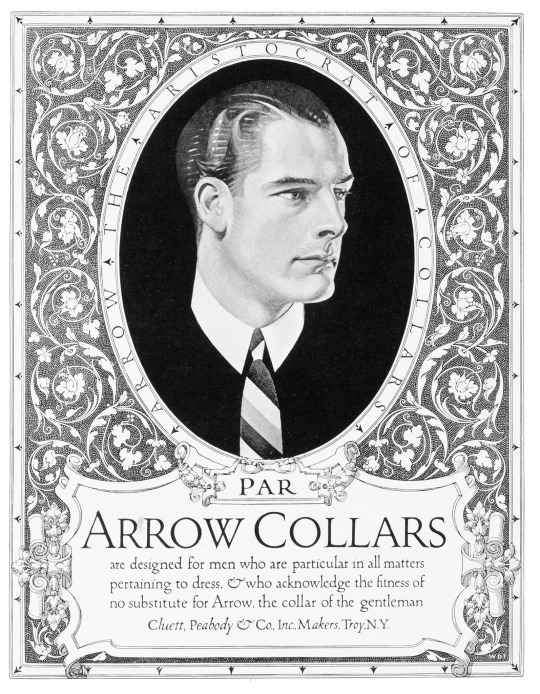


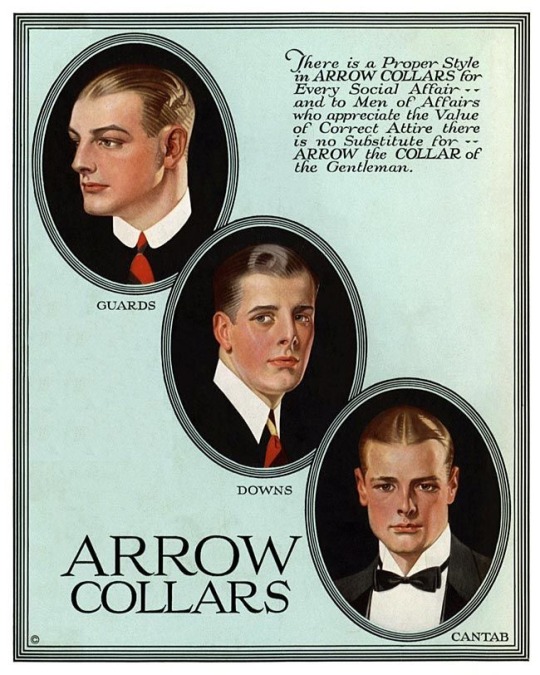
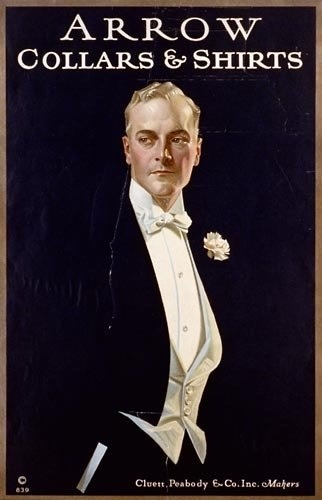
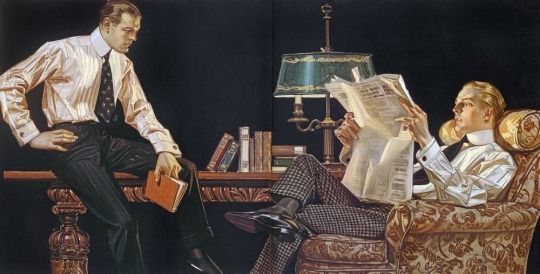

daisy buchanan to jay gatsby in “the great gatsby” + the arrow collar man, 1905-1931, by j.c. leyendecker (modeled after leyendecker’s lover, charles beach).
#the great gatsby#jay gatsby#jc leyendecker#j c leyendecker#j.c. leyendecker#the arrow collar man#arrow collar man#queer aesthetic#disclaimer: charles was only one of a couple of models for ACM
582 notes
·
View notes
Text
round 2, part c
9 notes
·
View notes